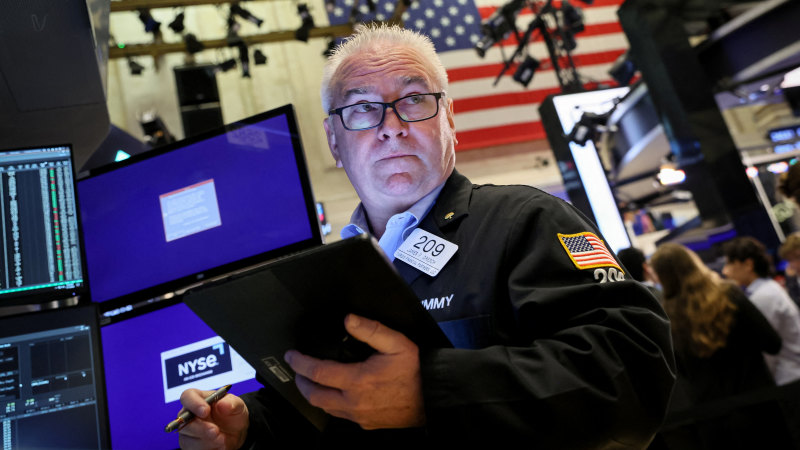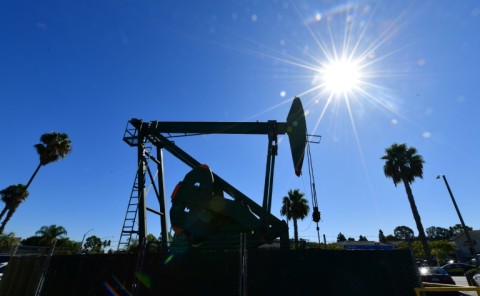By Staff reporter Updated October 16, 2024 — 11.30am
The Australian sharemarket opened lower on Wednesday, tracking losses on Wall Street, which pulled back from its records after the price of crude oil tumbled and technology stocks faltered.
The S&P/ASX 200 fell 25.30 points, or 0.3 per cent, to 8293.10 as of 11.11am AEDT, with nine of the 11 industry sectors retreating. Energy stocks and miners led the declines, pulled lower by the oil price slump and a disappointing trading update by mining giant Rio Tinto. The losses come after the ASX added 0.8 per cent on Tuesday.
Technology stocks weighed on Wall Street. Credit: Reuters
Defying the negative sentiment, oil major Woodside sent its shares higher after saying its production volumes had jumped to a record in the latest quarter.
Rivals Santos and Origin lost 1.6 per cent and 1.1 per cent, respectively, following Exxon Mobil and other global energy giants lower after oil prices tumbled more than 4 per cent. A barrel of Brent crude, the international standard, has fallen back below $US75 from more than $US80 last week.
Loading
Crude prices have been weakening as China’s flagging economic growth raises concerns about demand for oil. At the same time, worries have receded about Israel possibly attacking Iranian oil facilities as part of its retaliation against Iran’s missile attack early this month. Iran is a major producer of crude, and a strike could upend its exports to China and elsewhere.
Woodside added 0.8 per cent after reporting record quarterly production of 53.1 million barrels of oil equivalent for the September quarter, and said its revenue jumped 21 per cent from a year ago.
Iron ore miners BHP (down 1.6 per cent), Rio Tinto (down 1.8 per cent) and Fortescue Metals (down 0.1 per cent) declined after Rio said its iron ore division shipped 84.5 million tonnes of ore from Western Australia in the September quarter, falling short of analyst forecasts.
Iron ore prices fell overnight fell as investors’ attention shifted from China’s plans for stimulus and the outlook for demand to prospects for supplies ahead of this week’s production reports, which apart from Rio’s report include updates yet to come from BHP and Brazil’s Vale. Coal miners also declined, with Yancoal and Whitehaven down 1.9 per cent and 2.3 per cent, respectively.
On the flipside, financial stocks and the communication services sector stayed in the green, with the big four banks all gaining between 0.4 per cent and 0.6 per cent.
Overnight on Wall Street, the S&P 500 fell 0.8 per cent, a day after setting an all-time high for the 46th time this year. The Dow Jones dropped 324 points, or 0.8 per cent, and the Nasdaq composite sank 1 per cent.
Nvidia was the heaviest weight on the S&P 500 and fell 4.5 per cent. It’s a cooldown for the chip company, whose stock is still up 166.2 per cent for the year so far on euphoria about the profits created by the boom around artificial-intelligence technology.
Stocks for companies across the chip industry fell after Dutch supplier ASML reported its latest quarterly results. CEO Christophe Fouquet said AI continues to offer strong upside potential, but “other market segments are taking longer to recover,” and ASML’s stock trading in the United States fell 16.3 per cent.
Boeing signalled that it could raise up to $US25 billion ($37.3 billion) in new stock or debt to shore up its balance sheet after years of heavy losses.
The company said in back-to-back regulatory filings that it could raise the cash over the next three years and enter into a new borrowing agreement with lenders.
Loading
Helping to keep the S&P 500 and Dow close to their records were gains for several financial companies following better-than-expected profit reports for the summer.
Charles Schwab jumped 6.1 per cent. More customers opened brokerage accounts at the company, helping to bring its total client assets to a record $US9.92 trillion.
Walgreens Boots Alliance was another winner, up 15.8 per cent, after topping analysts’ forecasts. The drugstore chain also said it will close about 1200 locations over the next three years as it tries to turn around its struggling US business.
In the bond market, trading of Treasurys resumed after a holiday on Monday, and yields sank following a weaker-than-expected report on manufacturing in New York state.
The yield on the 10-year Treasury fell to 4.03 per cent from 4.10 per cent late on Friday. Manufacturing has been one of the areas of the US economy hurt most by high interest rates caused by the Federal Reserve in its efforts to slow the economy enough to stamp out high inflation.
With AP
The Market Recap newsletter is a wrap of the day’s trading. Get it each we e kday afternoon .
Most Viewed in Business Loading
https://www.smh.com.au/business/markets/asx-set-to-slide-as-wall-street-retreats-oil-prices-tumble-20241016-p5kimo.html?ref=rss&utm_medium=rss&utm_source=rss_feed




